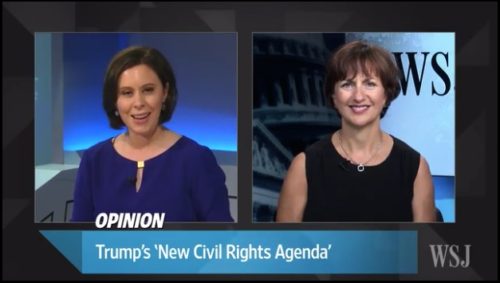by Jeanne Allen
the 74
September 12, 2016
Jeanne Allen: What’s a School Choice Warrior to Do During This Political Campaign?
Opinion Journal: Trump’s ‘New Civil Rights Agenda’

September 9, 2016
WSJ Opinion Journal
Center for Education Reform Founder and CEO Jeanne Allen on the candidate’s clarion call for school choice. Watch the video here.
Trump Makes Promise to Be ‘Nation’s Biggest Cheerleader for School Choice’
by Arianna Prothero
Education Week
September 9, 2016
GOP presidential nominee Donald Trump said Thursday that, if elected, he’d be the “nation’s biggest cheerleader for school choice” and offer states the chance to use $20 billion in federal money to create vouchers allowing children in poverty to attend the public, charter, or private school of their choice.
[…]
Early Reaction
Jeanne Allen, the founder of the Center for Education Reform, which supports school choice, called the idea “pie in the sky”, given the current Washington political dynamic. “Congress typically doesn’t write $20 million checks for programs without a real mandate,” she said.
But she also said the plan is very ambitious, and noted that Trump did not say the $20 billion for his school choice idea would have to come from the current U.S. Department of Education budget. “It’s dramatically more money than any other candidate has talked about for school choice,” Allen said.
Editorial: Charter schools, John Oliver and the NAACP
by Editorial Board
Chicago Tribune
September 9, 2016
Last month comedian John Oliver unleashed a caustic — and funny — broadside on charter schools in America. He spotlighted the worst of the worst charters, the ones that fail students, escape rigorous oversight and cost taxpayers. If you want to know how any of that is funny, well, just watch the video.
The pro-charter Center for Education Reform, however, wasn’t amused. The attack was “a very unfair, unfortunate, unbalanced, unwarranted and generally unhinged tirade against charter schools,” it harrumphed in a statement.
But then the group cleverly responded with a video contest, “Hey John Oliver, Back off My Charter School!” The center offers a $100,000 prize to the chosen school of the winner who “shows John Oliver why making fun of charter schools is no laughing matter … and why we need more opportunity, not less.”
What a great opportunity for the winner, whoever she or he will be, to dispense with defensiveness and respond in kind to Oliver’s tirade: with facts and with a dollop of humor, we hope.
What’s not amusing, though, is the NAACP’s updated stance on charters. In July, NAACP delegates passed a resolution calling for a moratorium on charter schools, pending an October vote of its national board. The NAACP justified its wrong-headed move by asserting that charters have aggravated school segregation, eroded local control of schools, wasted public funds, and disproportionately disciplined minority students. The NAACP is joined by The Movement for Black Lives, an alliance of more that 50 advocacy groups, in declaring charters the wrong antidote to failing schools.
But they’re missing the point. As with all public schools — and remember, charters are public schools — there are good ones and bad ones. Charters have freedom to innovate in educating children and a limited-time contract to produce results. If they fail, they should close. And district leaders should make sure that happens.
Last year, Chicago Public Schools CEO Forrest Claypool launched an aggressive push to force improvement of flailing charters and more swiftly close those that don’t measure up. We applauded that move, which came as 42 aldermen demanded that CPS slap a moratorium on charter expansion. The City Council proposal died, but the idea of strangling charter expansion staggers on, emerging as part of the long-running talks on a new teachers contract between CPS and the Chicago Teachers Union. Amazingly, CPS has volunteered to squelch its own charter expansion to appease charter-loathing teachers union officials.
We oppose a moratorium or caps on charter numbers because some schools, such as the Noble Network of Charter Schools, are stellar performers. Others aren’t. Why not let the best thrive and expand in Chicago?
Charters grow not because district officials lavish resources on them — they don’t — but because the schools deliver results. A 2015 Stanford University study of charters in 41 urban areas in 22 states showed significant long-term gains: Low-income black students received the equivalent of 59 days of additional learning in math and 44 days of additional learning in reading compared with their peers in traditional schools.
Parents sent 61,000 children to Chicago charter schools last year in the hope that they would learn more. Mature more. Succeed in rigorous settings.
We anticipate watching the winning video in the Beat John Oliver contest. We hope it’s a hoot. And we hope NAACP board members take their own look, and consult with many parents of charter students, before the October vote.
In addition to the Chicago Tribune, you may find this article on The Columbus Dispatch, Watertown Daily Times,The Lawton Constitution,The (Norwich) Bulletin, and Arca Max.
Opponents telling lies to keep cap on charters

by Jeanne Allen
Cape Cod Times
September 9, 2016
The claim that charter schools drain resources from traditional public schools is “absurd” and an “outright lie,” as many reputable researchers as well as editorial boards have acknowledged and documented.
Every year, the National Education Association and American Federation of Teachers encourage and support legislation that rolls back charter schools. This year is no different, with the NEA planning to spend nearly $36 million to “seek political and legislative outcomes that support great public schools and sustainable organizational power,” and setting aside 1.4 million specifically for anti-charter efforts in Massachusetts.
Meanwhile, the local Massachusetts Teachers Association approved more than $9 million to fight the expansion of charter school opportunities for children.
More than a decade of data, research and success stories indicate that charter schools have had a positive impact on not only the students they serve, but other students throughout the system.
It’s shameful that so much money is being devoted to maintaining the status quo and spreading false information while more than 30,000 children are waiting for the chance to access a better learning environment.
Jeanne Allen
Washington, D.C.
– The writer is founder and CEO of The Center for Education Reform.
Trump Says He’ll Be ‘Nation’s Biggest Cheerleader for School Choice’
by Arianna Prothero
Education Week
September 9, 2016
GOP presidential nominee Donald Trump said Thursday that, if elected, he’d be the “nation’s biggest cheerleader for school choice” and offer states the chance to use $20 billion in federal money to create vouchers allowing children in poverty to attend the public, charter, or private school of their choice.
[…]
Early Reaction
Jeanne Allen, the founder of the Center for Education Reform, which supports school choice, called the idea “pie in the sky”, given the current Washington political dynamic. “Congress typically doesn’t write $20 million checks for programs without a real mandate,” she said.
But she also said the plan is very ambitious, and noted that Trump did not say the $20 billion for his school choice idea would have to come from the current U.S. Department of Education budget. “It’s dramatically more money than any other candidate has talked about for school choice,” Allen said.
Trump Pitches Using Federal Funds for School Choice, Champions Merit Pay
GOP presidential nominee Donald Trump said Thursday that, if elected, he’d be the “nation’s biggest cheerleader for school choice” and offer states the chance to use $20 billion in federal money to create vouchers allowing children in poverty to attend the public, charter, or private school of their choice.
And he said he’s a supporter of merit pay for teachers—a signature policy of both President Barack Obama and George W. Bush’s administrations—although he did not explain how he hopes to further the cause, other than rhetorically taking aim at tenure in this fact sheet.
“There is no policy more in need of urgent change than our government-run education monopoly,” the GOP presidential nominee said in a speech at a charter school in Cleveland. “The Democratic Party has trapped millions of African-American and Hispanic youth” in struggling schools.
“We want every inner city child in America to have the freedom to attend any school,” Trump said.
Trump said that the $20 billion in federal funds could be combined with more than $100 billion in state and local money to create vouchers of up to $12,000 annually for the nation’s poorest kids. He did not say where the $20 billion in funding would come from, but it’s possible he was referring to Title I money for disadvantaged students, funded at about $15.5 billion right now. His plan would depend on state and local cooperation—if states and districts decided not to add their own money to the federal financing, the scholarships would pretty paltry.
“Take Back Your Schools” Action Guide Released

Five Foundational Steps to Ensure Schools Work Better for All Children from the Nation’s Leader in Education Innovation and Opportunity
FOR IMMEDIATE RELEASE
September 7, 2016
WASHINGTON, DC — Today, with annual Back to School rituals now fully underway, parents, grandparents and engaged citizens have a new tool to help them make a fundamental difference in the education of their children and ensure that the status quo is the exception, not the rule.
The “Take Back Your Schools” Action Guide – fully online – provides five impactful steps to guide parents and citizens who want to be engaged in making education better for their children, their communities and the nation. Said CER’s founder and CEO Jeanne Allen, “With twenty-five years of evidence-based solutions underway, improving parent power and results for kids is no longer a mystery.”
Among the actions that citizens can take, the Center provides access to information about:
- Transparency: School report cards, national and international comparisons
- Opportunity: How states are doing in providing meaningful options
- Engagement: Tools that empower parents & others with critical information
- Politics & Policy: How to make sense of candidates and the policies they espouse
In addition to the five foundational steps available here, the Center will continue to build upon its unique storehouse of data and action steps to help citizens advance education innovation and opportunity in America so that all can achieve upward mobility, and the American dream.
To learn more, visit edreform.com. For models of success and opportunities to interview CER leadership about these and other efforts, contact CER Communications Director Michelle Tigani at michelle@edreform.com.
Newswire: September 6, 2016 — Happy Back to School! — John Oliver Charter Schools Pushback Continues — Goodwill’s New Adult Education Charter School in DC
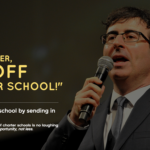
HAPPY BACK TO SCHOOL! Watch your inbox — CER’s “Take Back Your Schools” guide is coming soon! In the meantime, check out a few evergreen things every parent needs to know.

20 DAYS. Calling parents, teachers, and students! Tell the world why you chose your charter school, and your school could win $100,000. Submit your video by Sept. 26. Contest details here.
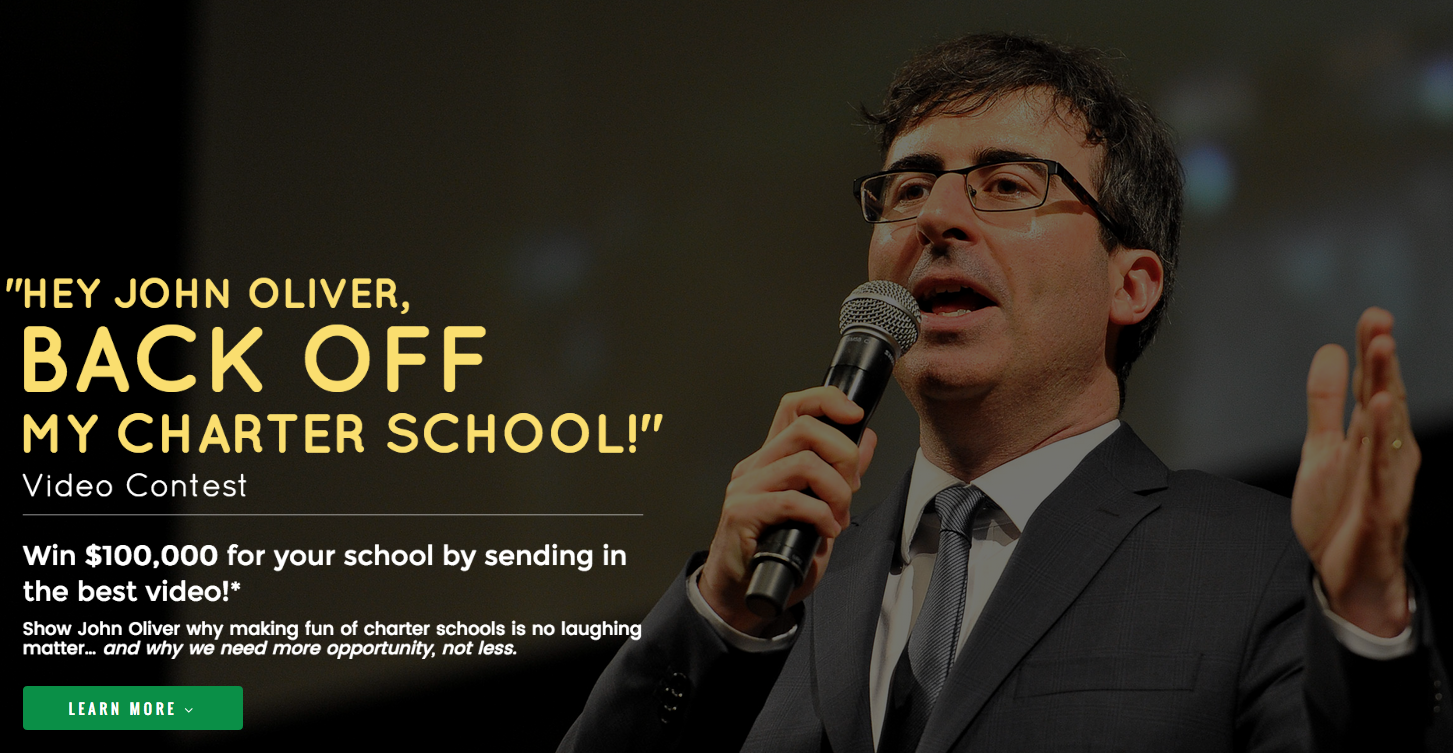
PUSHBACK CONTINUES. CER launched the #BackOffMyCharter contest to show the world that John Oliver’s charter critique was hugely unbalanced. We certainly aren’t the only ones arguing this point. Political comedy channel We the Internet TV produced this short video that’s worth a watch and share.
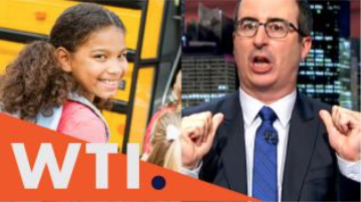
MEETING DEMAND. As Back to School is now officially in full effect, there are more than 30,000 Massachusetts students wishing they could be starting their school year off in a charter school. It’s time to expand charters to meet demand.
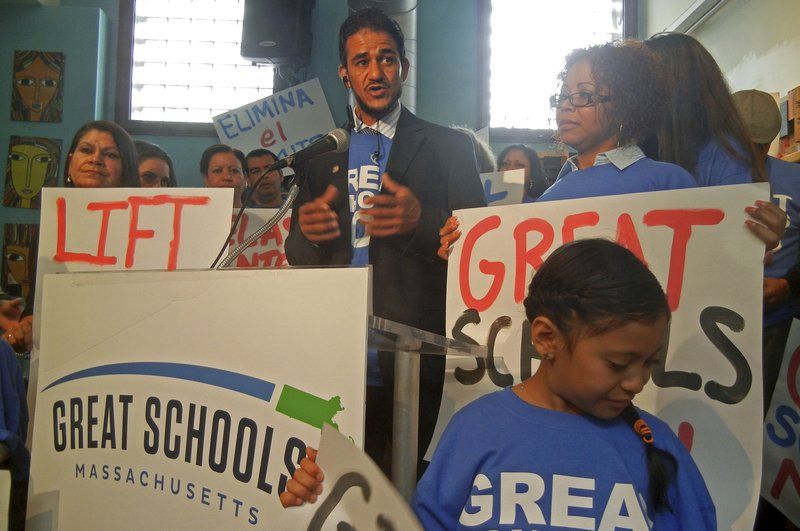
NEW OPPORTUNITY IN DC. The power of charter schools goes beyond traditional K-12 learning. The start of this school year marks year one for Goodwill’s charter school focused on helping adults earn their high school diploma.
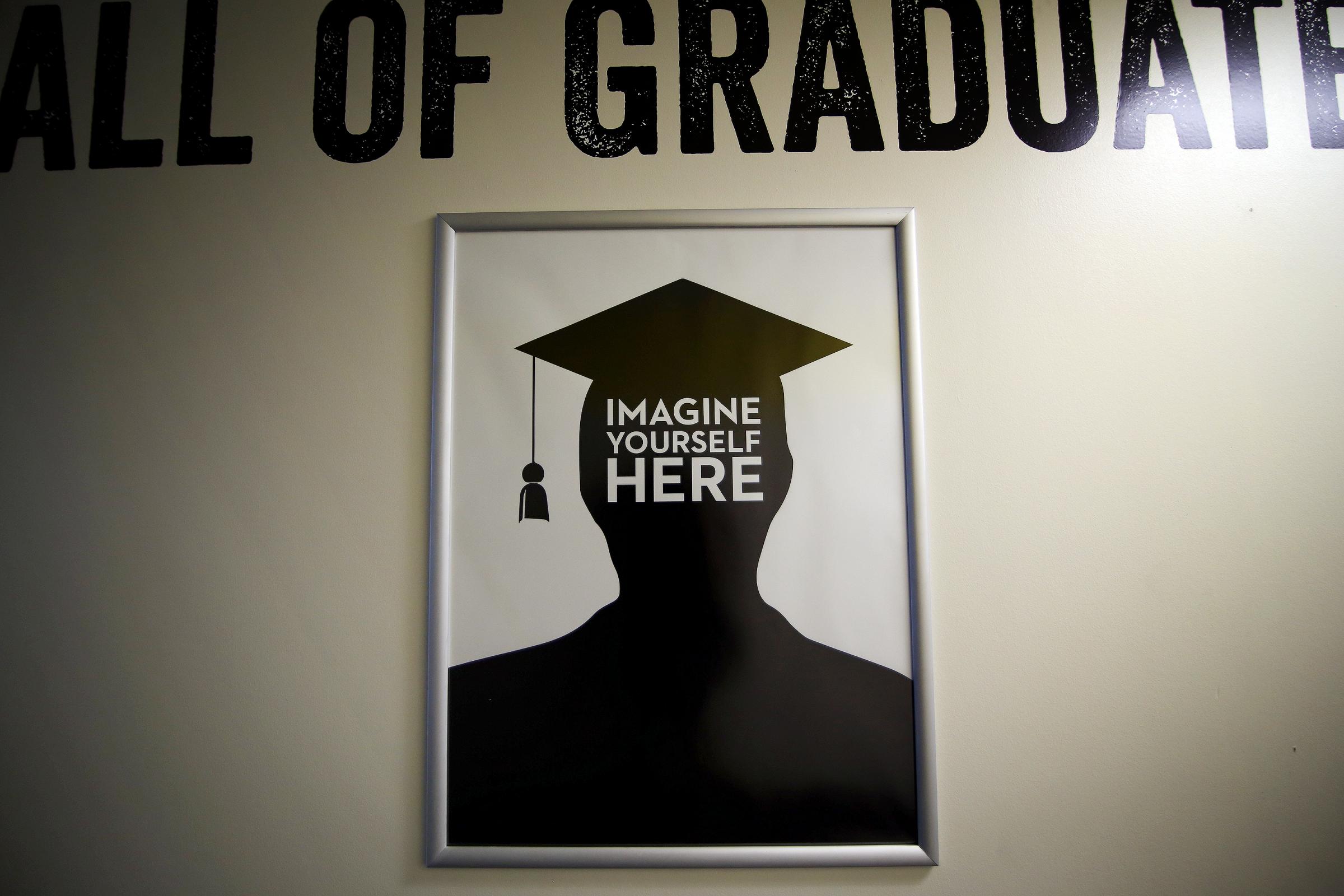
It’s time to expand Bay State’s charter schools to meet the demand

Letter to the Editor
Lowell Sun
September 2, 2016
When it comes to public charter schools and funding, it’s time to set the record straight.
The Bay State provides one of the most generous reimbursement plans in the nation when students choose to leave conventional schools for public charter schools. In the last five years, Massachusetts districts have been reimbursed $350 million for students they are no longer educating — students who have decided a public charter school is a better fit for their unique learning needs.
The fact that people are claiming public charter schools drain resources from traditional public schools is “absurd” and an “outright lie,” as many nonpartisan research organizations and editorial boards, including The Sun, have acknowledged.
The beauty of charter schools is that they seek to acknowledge that there’s no “one-size-fits-all” when it comes to educating our children. Public charter schools are held accountable for results, while they’re given the freedom and flexibility to vary their methods, structure, curriculum, based on students’ learning needs.
Just as a traditional public school isn’t a fit for a good student, a charter school is not a good fit for every student; however, given that there are more than 30,000 students yearning for a charter school opportunity, it’s time to give them access a public charter school education and allow charter schools to expand to meet demand.
JEANNE ALLEN
The Center for Education Reform
Washington, D.C.










